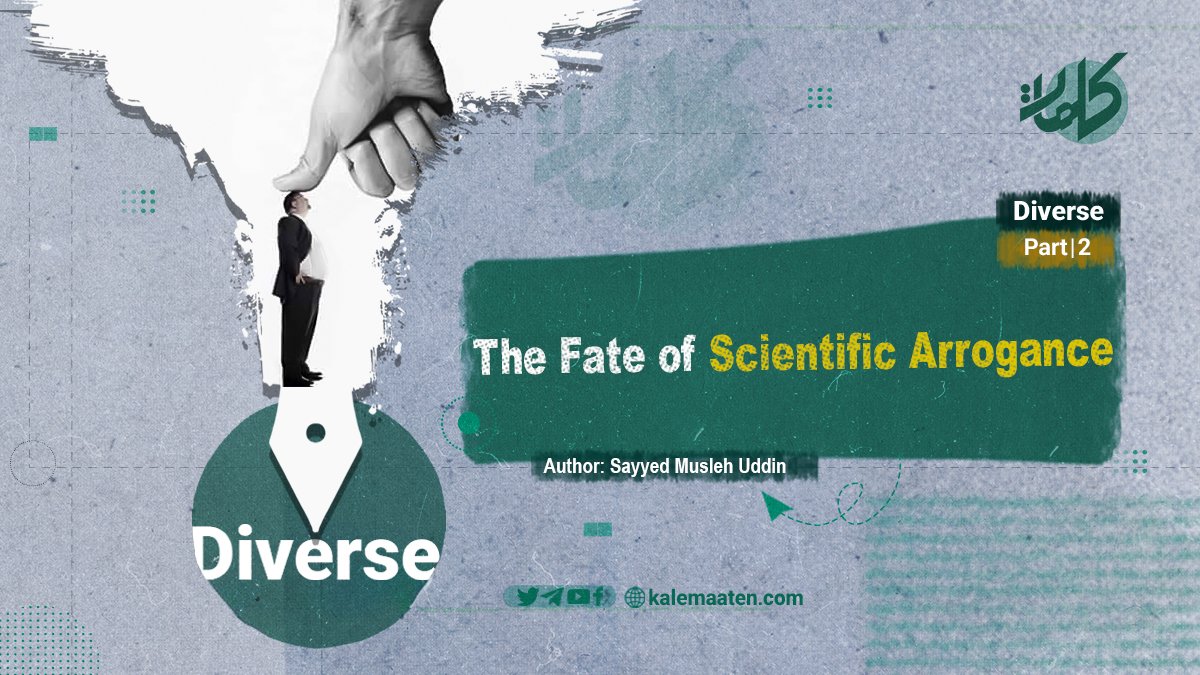Author: Sayyed Musleh Uddin
The Fate of Scientific Arrogance (Part Two)
The Reality of Arrogance
It is obvious that no arrogant person considers himself arrogant. The more deeply this trait is inside him, the more he denies it. This is why an arrogant scholar remains unaware of his arrogance and says, “I am a scholar in the path of Allah. What business do I have with arrogance? Astaghfirullah! Where is my arrogance?”
Sometimes the same kind of heedlessness happens with regard to death. A person who believes and is certain about death is so careless about it that it seems as if death is a myth or happens only to others. He says, “My grandfather has not died yet, and my father is still alive. So when will death come? I have at least seventy more years left. Death will never come for me now. Why should I think about it?”
But the truth is the opposite. Death is always near a person, and he must always be mindful of it. Forgetting death is a sign of a hardened heart, long hopes, and it is the root of all heedlessness.
Similarly, an arrogant scholar’s reason for arrogance is this heedlessness and ignoring his own state. He does not pay attention to it. The reality of arrogance is that the scholar thinks all his arrogant thoughts and actions are fine. He sees no need to reflect on them. Unless he thinks about their signs or a friend tells him, he does not realize his own arrogance. Others notice this trait sooner than the person himself.
Levels and Degrees of Arrogance
One level of arrogance is when a person thinks he is better than others in wealth, children, intellect, beauty, and so on. He sees others as low and worthless. Arrogance in these cases is a big foolishness because Allah is the true Owner of all these things. They are only temporary and given as a test. Allah can take them all away instantly if He wishes. After death, all these things disappear. So why be arrogant?
The arrogant person thinks that even though these things are temporary for him, they are still a reason to be proud. He thinks this is his superiority over others. But many rich people consider themselves less than others in knowledge and deeds. This kind of pride, based on wealth, is a lower degree than pride based on knowledge and deeds. Because of this, arrogant old and poor people have faced more anger from Allah. They do not even have false reasons to be proud of, yet they are arrogant.
The greatest arrogance is when a person tries falsely to become great or a saint. True honor and greatness are in closeness to Allah. Even great kings of the world know this and honor serving the poor. So arrogance in knowledge and action is the worst kind of pride and foolishness. Wealth, children, and such are visible and people can see how they cause pride. But pride in knowledge and action is invisible. It is all theory and imagination because whether an action is accepted depends on Allah’s grace and pleasure.
Even the greatest saint cannot say that his deeds match Allah’s greatness or are accepted by Him. No one knows this. The more a person knows Allah, the more he sees his deeds as small and fears them. If sometimes he shows a good deed as thanks, he also shows his weakness and humility. This is not arrogance. There is a worse arrogance, when a person acts humble on the outside but thinks himself better than others by this. Such a person does not feel arrogant, so his sin is worse than normal arrogance. [1]
Definition of Arrogance
Arrogance means a person thinks he is better than others in good qualities and looks down on others. The hadith defines arrogance like this: “الْكِبْرُ بَطَرُ الْحَقِّ، وَغَمْطُ النَّاسِ” “Arrogance is denying the truth and looking down on people.” [2]
A person notices his arrogance when he feels superior to others or sees something in himself that makes him look down on others and think he is better. These causes include:
-
Knowledge
-
Talent
-
Wealth
-
Worship
-
Beauty
-
Children
-
Old age
-
and so on.
Istikbar (Arrogant Rebellion)
This means extreme self-reliance and pride. In the Qur’an, istikbar is condemned because it is like a kind of shirk (associating partners with Allah). Is istikbar not trying to resemble Allah’s greatness?
It seems the arrogant try to deny their usual state to equal the One who is “Al-‘Aliyy, Al-Kabir” (The Most High, the Most Great). The word istikbar is used 40 times in the Qur’an and mustakbir (arrogant person) six times. Istikbar is the sin of everyone who refuses to submit to Allah.
The first sin of Satan was istikbar. When he was commanded to prostrate to Adam, all angels did except Iblis. He refused, was arrogant, and became a disbeliever.
Continues…
Previous Part/ Next Part
[1] The root of all sins, p. 57.
[2] Sahih Muslim, Hadith No. (91): (۹۱) عَنْ عَبْدِ اللهِ بْنِ مَسْعُودٍ، عَنِ النَّبِيِّ صَلَّى اللهُ عَلَيْهِ وَسَلَّمَ قَالَ: «لَا يَدْخُلُ الْجَنَّةَ مَنْ كَانَ فِي قَلْبِهِ مِثْقَالُ ذَرَّةٍ مِنْ كِبْرٍ» قَالَ رَجُلٌ: إِنَّ الرَّجُلَ يُحِبُّ أَنْ يَكُونَ ثَوْبُهُ حَسَنًا وَنَعْلُهُ حَسَنَةٌ، قَالَ: «إِنَّ اللهَ جَمِيلٌ يُحِبُّ الْجَمَالَ، الْكِبْرُ بَطَرُ الْحَقِّ، وَغَمْطُ النَّاسِ».



